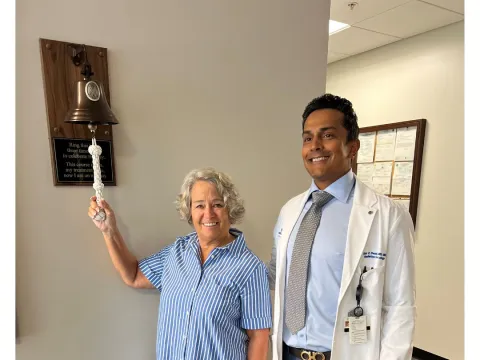- Megan Paquin
Choose the health content that’s right for you, and get it delivered right in your inbox.
From stiffness to a small tremor or speech changes, the signs of Parkinson’s disease are diverse and often subtle. Although Parkinson’s disease cannot be cured, early detection of the progressive nervous system disorder can make a dramatic difference in helping control symptoms. Scientists at the AdventHealth Translational Research Institute are working on diagnostic advancements to help more patients before they experience significant nervous system damage.
Kirk Erickson, Ph.D., director of translational neuroscience at AdventHealth’s Central Florida Division, was recently part of a research team that has developed a blood test that detects an indicator of Parkinson’s disease. Based on earlier studies that associated mitochondrial DNA damage with an increased risk of Parkinson’s disease, Erickson, as part of a team led by Duke Health, helped develop an assay, or testing procedure, that successfully measures higher levels of mitochondrial DNA damage in blood cells collected from patients with Parkinson’s disease compared to people without the disease. The newly developed test also identified high levels of the damaged DNA in the blood samples of those with the LRRK2 genetic mutation, which has been associated with an increased risk of the disease as well.
So, what does this mean for those most at-risk for Parkinson’s disease? Once the test becomes available, future patients may experience shorter wait times to be diagnosed with the disease, enabling potentially greater access to medications and other therapies that may ease symptoms and delay progression.
“This breakthrough is a game-changer,” said Erickson. “Currently, a diagnosis of Parkinson’s disease takes time as it is based on a patient’s medical history, along with a physical and neurological exam. This process is compounded by the fact that many symptoms of Parkinson’s disease can go unnoticed as they begin to affect the body’s nervous system. With a simple blood test, our aim is to reduce the time to diagnosis and help patients get the critical care they need to live longer and more comfortably with Parkinson’s disease.”
Erickson added, “Our research continues as we hope to be able to detect the disease even before our patients present with symptoms.”

The Duke Health team that spearheaded this research was led by senior author Laurie Sanders, Ph.D., an associate professor in Duke School of Medicine’s departments of neurology and pathology and member of the Duke Center for Neurodegeneration and Neurotherapeutics. The research received support from numerous international organizations. To read the study, please visit Science Translational Medicine here.
Recent News

AdventHealth named among U.S. News & World Report’s fifth annual 2026 Best Hospitals for Maternity Care
This marks the third year in a row AdventHealth Shawnee Mission has appeared on the U.S. News & World Report’s list of Best Hospitals for Maternity Care.

AdventHealth Waterman strengthens access to expert specialty care with expansion of Mount Dora medical plaza
Second floor buildout adds orthopedics, sports medicine, women’s health and heart care for Lake County

Expanding hope through innovation: AdventHealth advances cancer care across East Florida
Cancer touches nearly every family, and in Flagler, Lake and Volusia counties, the demand for timely, advanced care keeps rising. AdventHealth’s East Florida Division, which includes seven hospitals...

A new chapter begins: AdventHealth Avista opens its on-campus surgery center
This milestone marks a meaningful new chapter for a team whose history stretches back more than two decades.

AdventHealth Porter Performs Rare, Complex Robotic Kidney Cancer Surgery
AdventHealth Porter has reached an extraordinary milestone in surgical innovation, completing what is believed to be the first robotic left radical nephrectomy with inferior vena cava (IVC)...

Amanda Robinson, DO, joins AdventHealth Medical Group Family Medicine, Internal Medicine & Pediatrics at Curtis Parkway
AdventHealth is pleased to announce that Amanda Robinson, DO, has joined AdventHealth Medical Group Family Medicine, Internal Medicine & Pediatrics at Curtis Parkway.

New hospital brings world-class, whole-person care to Minneola
AdventHealth Minneola will bring nationally recognized care close to home in South Lake County.

New surgeon expands local access to advanced colorectal care in Volusia County
Dr. Mark Heimberger joins AdventHealth as part of its continued investment in bringing minimally invasive and robotic colorectal treatment options to the region’s growing community.

AdventHealth Lake Placid launches Low Dose Lung Screening CT program to help detect cancer early
AdventHealth Lake Placid has launched a new Low Dose Lung Screening CT program, bringing this life-saving service closer to home for people who live in and around Lake Placid.

Delivering on the mission: AdventHealth Supply Chain and Business Services' impact is part of every patient story
Every day, more than 1,500 Supply Chain and Business Services team members work behind the scenes with more than 3,000 suppliers to support how AdventHealth patients receive care.

Albit Paoli, MD joins AdventHealth Medical Group Orthopedics & Sports Medicine
AdventHealth is pleased to announce that Albit Paoli, MD, has joined AdventHealth Medical Group Orthopedics & Sports Medicine at Calhoun and AdventHealth Medical Group Orthopedics & Sports Medicine at...

AdventHealth expands access to primary care in the heart of DeLand
AdventHealth has opened a new Primary Care+ location in the heart of downtown DeLand, giving residents a simple way to get everyday care close to where life happens. The primary care practice offers...
